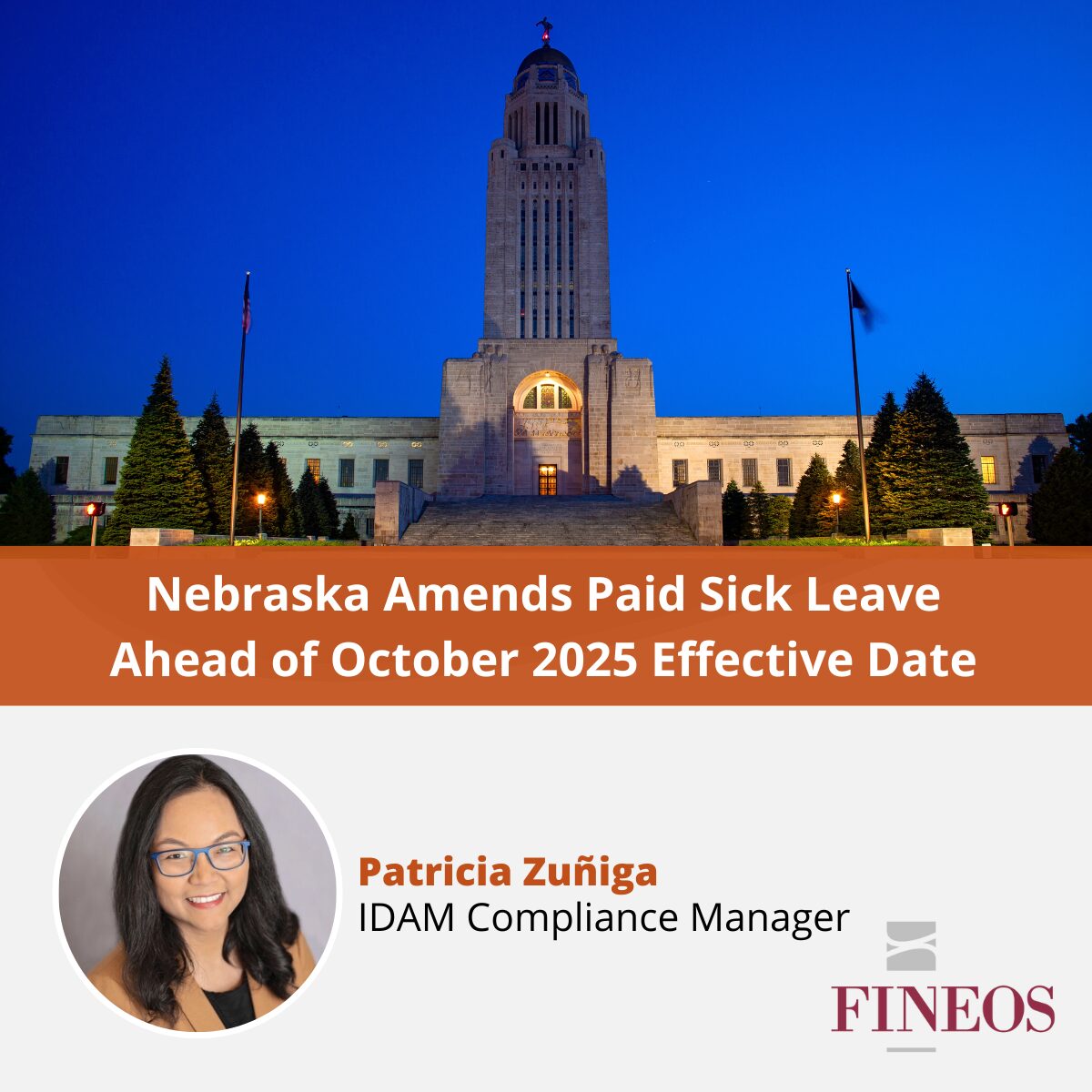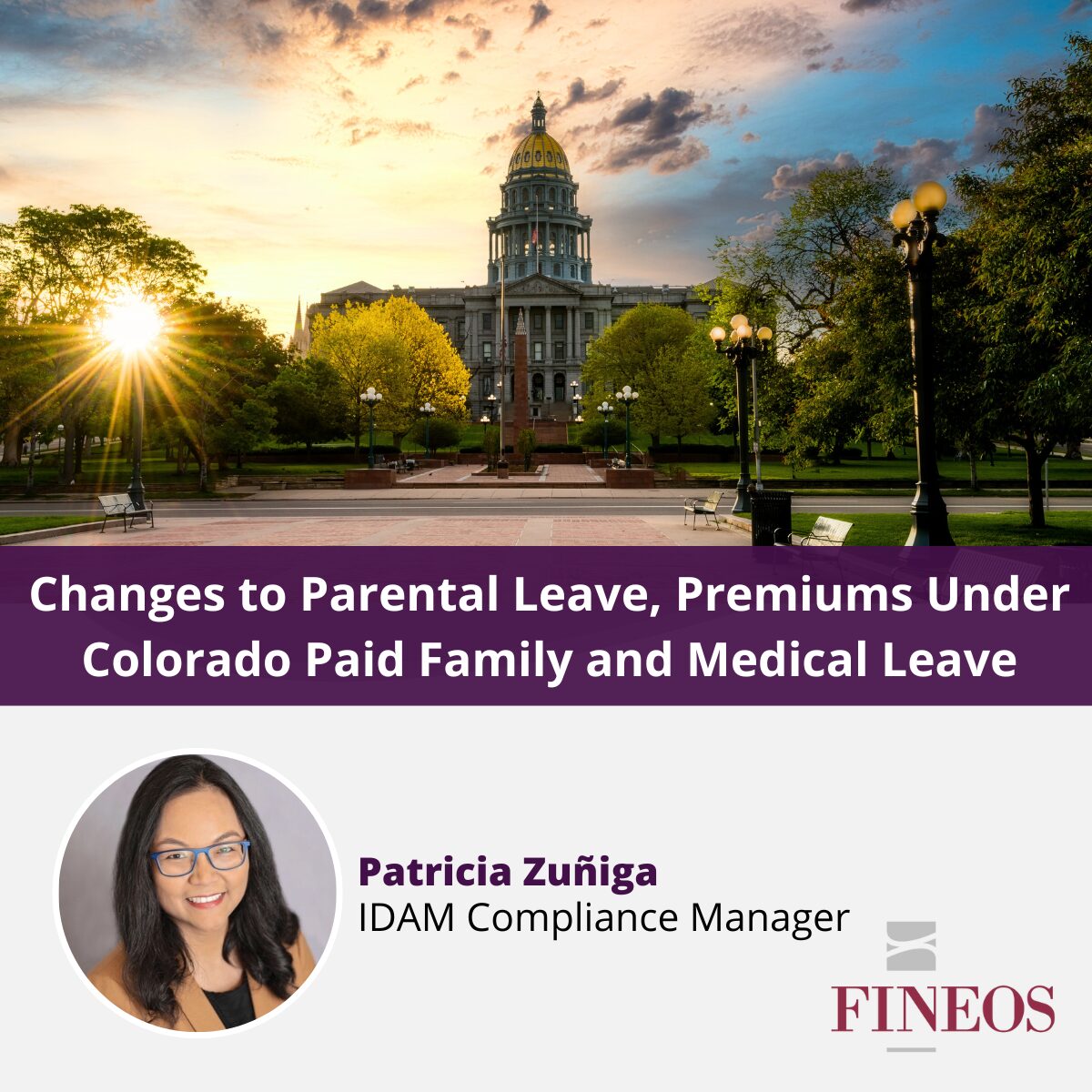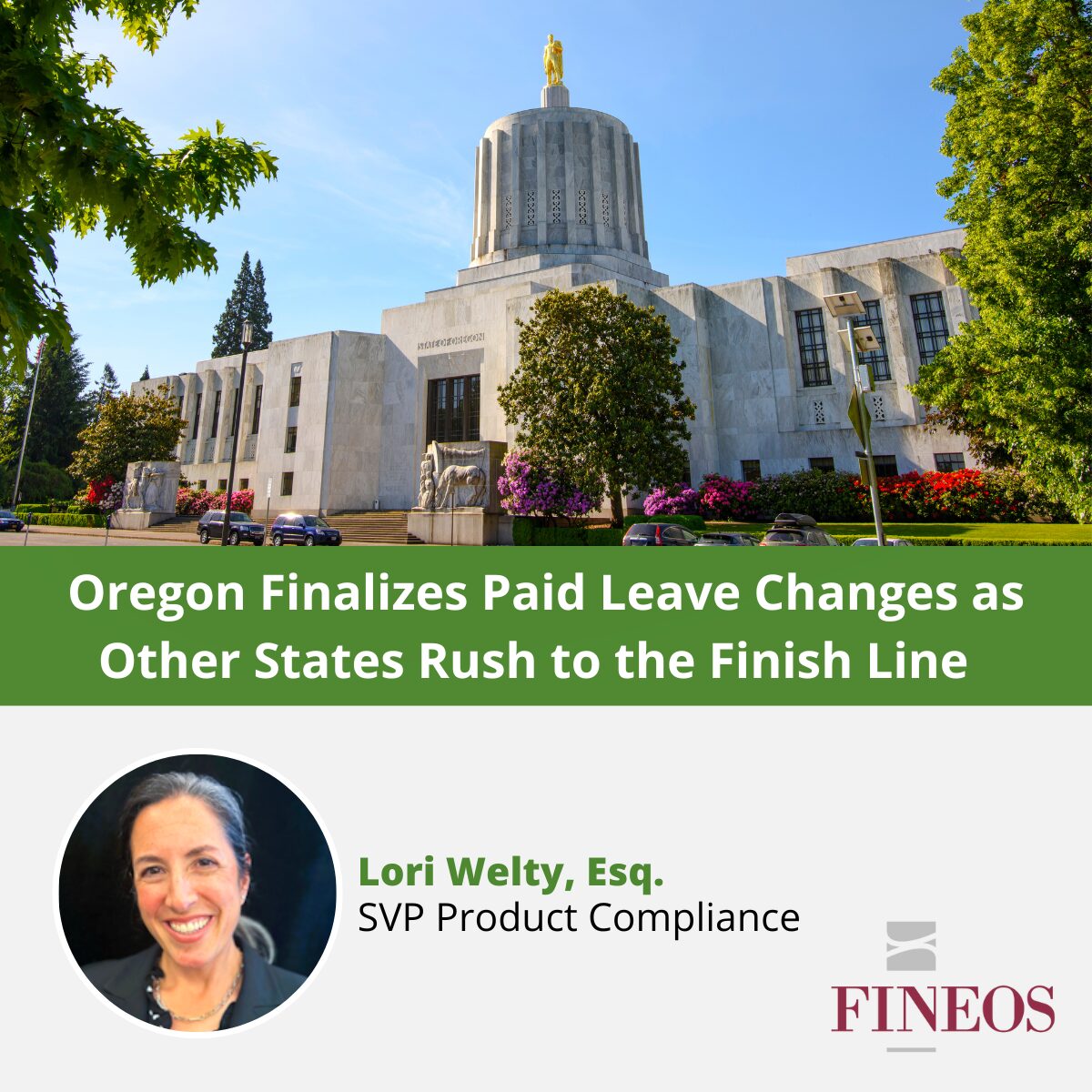With many states wrapping up their legislative sessions for spring adjournment, we have seen significant legislative activity that has achieved or is approaching final enactment. Get the quick what, when, where, and why below:
Enacted
What: MD Senate Bill 275, (*) Maryland Paid Family and Medical Leave Program
Where: Maryland
When: Passed the legislature and sent to the governor on 3/31. Gov. Hogan vetoed the measure, but the General Assembly quickly voted to override the veto. Contributions begin 10/2023, with benefits 1/2025.
Why: This bill enacts Paid Family and Medical Leave in Maryland. It provides 12 weeks of paid leave for employees for:
- Bonding leave;
- To care for a family member with a serious health condition;
- For the employee’s own serious health condition;
- To care for a service member who is the covered individual’s next of kin; or
- Because the covered individual has a qualifying exigency arising out of the deployment of a service member who is a family member of the covered individual.
Employees who take bonding leave can take up to 24 weeks for a combination of bonding and leave for their own serious health condition.
What: Washington Senate Bill 5649, Amending Washington Paid Family and Medical Leave
Where: Washington State
When: Signed by the governor 3/30. The bill (WA S 5693) that provides the necessary funding to support this amendment was signed 4/4. Effective date: 6/9/2022.
Why: This bill adds bereavement leave to the WA PFML program and provides additional definitions and provisions regarding postnatal leave.
- The bill defines the “postnatal period” as the first six weeks after birth and clarifies that a certification of a serious health condition is not required for paid leave benefits used in the postnatal period. The bill also provides that any paid leave benefits used in the postnatal period must be medical leave unless the employee chooses to use family leave during the postnatal period.
- The bill provides for bereavement leave for a parent grieving the loss of their child during the seven calendar days following the death. The child must be under 1 year old, or under the age of 18 for an adopted child.
What: Virginia House Bill 1156, Virginia Private Family Leave Insurance
Where: Virginia
When: Signed by the Governor 4/7. Effective 7/1/2022.
Why: This bill establishes family leave insurance as a class of insurance and defines “family leave insurance” as an insurance policy issued to an employer related to a benefit program to pay for the employee’s income loss due to:
- the birth of a child or adoption of a child by the employee;
- placement of a child with the employee for foster care;
- care of a family member of the employee who has a serious health condition; or
- circumstances arising out of the fact that the employee’s family member who is a service member is on active duty or has been notified of an impending call or order to active duty.
Under the bill, family leave insurance may be written as an amendment or rider to a group disability income policy, included in a group disability income policy, or written as a separate group insurance policy purchased by an employer. The bill prohibits delivery or issue for delivery of a family leave insurance policy unless a copy of the form and the rate manual showing rates, rules, and classification of risks have been filed with the State Corporation Commission.
Request for Proposal
What: New Hampshire PFML RFP, RE: New Hampshire Paid Family and Medical Leave
Where: New Hampshire
When: RFP issued on 3/28/2022. Proposals submitted in response to the RFP must be received by the Division of Procurement and Support Services Bureau of Purchase and Property no later than May 9, 2022.
Why: Gov. Chris Sununu, the New Hampshire Departments of Administrative Services and Employment Security, and the Insurance Department, released a Request for Proposal (RFP) seeking a commercial insurance carrier to fully insure and administer the Granite State Paid Family and Medical Leave (PFML) Plan. The successful bidder will provide coverage to three participant groups: the State as an Employer, Private and Other Public Employers of any size, and the Individual Group. Once approved by the Governor and Executive Council, the contract term extends through December 31, 2027 and can be extended for up to two additional years.
Questions or requests for clarifications should be submitted via email to Andrew Bennett at Andrew.J.Bennett@das.nh.gov.
The Request for Proposals can be accessed here, or via the Statewide Bids and Proposals portal.
What: West Hollywood Paid and Unpaid Sick Leave Ordinance
Where: West Hollywood, California
When: Enacted 11/15/2021. Effective 7/1/2022.
Why: This ordinance requires employers to provide at least 96 paid hours off per year for sick leave, vacation, or personal necessity to employees who work at least 40 hours a week. Employees must be permitted to use this time after 6 months of employment with the employer. Employers must also permit full-time eligible employees to take at least 80 additional hours per year of unpaid time off to be used for sick leave for the illness of the employee or a member of his or her immediate family where the employee has exhausted his or her compensated time off for that year.
What: Oregon Senate Bill 1515, Amending Oregon Paid Family and Medical Leave
Where: Oregon
When: Signed by the governor 3/7. Effective 1/1/2023.
Why: Changes the definition of Benefit year to mean 52 consecutive weeks beginning on the Sunday prior to the start of leave, unless that period would result in an overlap of any quarter of the Base year of a previous claim, in which case the Benefit year is a period of 53 consecutive weeks beginning on the Sunday prior to the start of leave. “Base year” is defined as the first four of the last five completed calendar quarters preceding the Benefit year.
What: Oregon Permanent Administrative Order
Where: Oregon
When: Effective 4/1/2022.
Why: Oregon Bureau of Labor and Industries (BOLI) adopted a permanent rule expanding the reasons for leave for Oregon’s paid sick and safe leave law for a public health emergency. Employees may now take leave for:
- an emergency evacuation order of level 2 (SET) or level 3 (GO) issued by a public official with the authority to do so, if the affected area subject to the order includes either the location of the employer’s place of business or the employee’s home address; or
- a determination by a public official with the authority to do so that the air quality index or heat index is at a level where continued exposure to such levels would jeopardize the employee’s health.
Pending Bills
What: IL Senate Bill 3120, Amending IL Child Bereavement Leave
Where: Illinois
When: Passed on 3/30. Awaiting the governor’s signature. If signed, the bill is effective immediately.
Why: This bill changes the name of the IL Child Bereavement Act to the IL Family Bereavement Leave Act. It allows an employee to take time off to grieve not just the death of a child, but also the death of a spouse, domestic partner, sibling, parent, mother-in-law, father-in-law, grandchild, grandparent, or stepparent. Additionally, it allows an employee to take time off for:
- a miscarriage;
- an unsuccessful round of intrauterine insemination or of an assisted reproductive technology procedure;
- a failed adoption match or an adoption that is not finalized because it is contested by another party;
- a failed surrogacy agreement;
- a diagnosis that negatively impacts pregnancy or fertility; or
- a stillbirth.
What: Alabama Senate Bill 31, Alabama Unpaid Parental Leave
Where: Alabama
When: Sent to the governor on 4/7. If signed, the bill will become effective on the 1st day of the 3rd month following approval of the governor.
Why: Requires employers to provide 12 weeks of unpaid family leave for bonding with a newborn or adopted child. The law defines eligible employee and employer as defined by the FMLA, and the leave runs concurrently with any available FMLA leave.
FINEOS Can Help
FINEOS will be ready to administer these laws or in the case of New Hampshire and Virginia, insurance products. Using modern insurance technology solutions like the FINEOS Platform can help insurance carriers remain compliant and competitive when leave legislation is revised and new products are authorized by governing jurisdictions. Learn more about how a modern, integrated disability and absence management (IDAM) solution can help your organization adapt to this rapidly evolving market and remain in compliance.
(*) Updated blog about Maryland’s new PFML law


